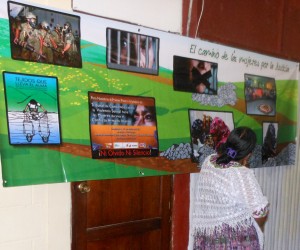 On Oct. 14, 2014 Guatemala’s Court for High-Risk Crimes ruled to open trial against two members of the Army for sexual slavery and domestic slavery against q’eqchís women in the military outpost of Sepur Zarco and other serious crimes perpetrated in the framework of the government counterinsurgency policies during the armed conflict.
On Oct. 14, 2014 Guatemala’s Court for High-Risk Crimes ruled to open trial against two members of the Army for sexual slavery and domestic slavery against q’eqchís women in the military outpost of Sepur Zarco and other serious crimes perpetrated in the framework of the government counterinsurgency policies during the armed conflict.
At the public hearing, Judge Miguel Angel Galvez ruled that there are sufficient elements for open the trial against colonel Esteelmer Reyes Girón, former chief of the Sepur Zarco military outpost, and Heriberto Valdéz Asij, former military commissioner in the region. Reyes will be judged for the crimes against humanity of sexual violence and sexual slavery, domestic slavery, and assassination of Dominga Coc and her two young daughters on the base. Valdez will face charges for crimes against humanity of sexual violence and forced disappearance.
Even after the military outpost was closed in 1988, the women still faced the physical and psychological consequences of the sexual violence. One of the cruelest results has been that they are stigmatized in their communities. According to the patriarchal logic, sexual violence is a crime for which the victims must pay. In spite of the fact that the rapes were committed in a context of terror and militarization, today the women are blamed for the sexual violence they suffered.The road to justice
Today the women of Sepur Zarco are demanding justice for these horrendous crimes against them. The road to justice they’ve come down started ten years ago. One of the most important strategies they employed was to build groups of women and alliances on the local and national level. They broke the silence and told their hard truth in a process of constructing the historic memory of the sexual violence against indigenous women during the armed conflict, published in a book in 2009. [1].
In 2010 the protagonists in this history, along with women of the other three regions of the country, participated in the Tribunal of Conscience against sexual violence against the women during the armed conflict in Guatemala. And in 2011, fifteen women of the Sepur Zarco group presented a criminal suit in a national court, demanding justice for the crimes committed against them and thier family members in the framework of transitional justice. In this process they have relied on the support of feminist and human rights organizations. For these organizations the fight for justice of the women of Sepur Zarco is part of their political commitment in favor of eliminating gender violence and the emancipation of women. [2].
An historic trial
The criminal rial brought by the Sepur Zarco women has national and international significance. In Guatemala, to date there is still total impunity for the crimes of sexual violence during the armed conflict. Although the Commission on Historical Clarification documented the sexual violence agasint the women was widely and systematically carried out by agents of the state, this is the first time that the charge has been presented in a court of law specifically for rape and sexual slavery.
This case also has worldwide relevance, since it is the first legal proceeding for sexual slavery during armed conflict that has been presented in the national jurisdiction where the acts took place. It will be a precedent-setting case for all efforts to end sexual violence during armed conflict, one of the most widespread and unrecognized violations of human rights, as well as eradicating impunity for these crimes.
Luz Méndez Gutiérrez is the co-autor of the book Mujeres q’eqchís: violencia sexual y lucha por la justicia (ECAP-IDRC) (forthcoming). She is a member of the Board of Directors of the National Union of Gualtemalan Women (Unión Nacional de Mujeres Guatemaltecas – UNAMG).
Photos: Luz Méndez
NOTES:
[1] Fulchiron, Amandine; Paz, Olga Alicia & López, Angélica (2009). Tejidos que lleva el alma. Memoria de las mujeres mayas sobrevivientes de violación sexual durante el conflicto armado. Guatemala: ECAP, UNAMG.
[2] Currently the Sepur Zarco women are supported by the Alliance Breaking the Silence and Impunity (Alianza Rompiendo el Silencio y la Impunidad), made up of Women Transforming the World (Mujeres Transformando el Mundo), Community and Psycho-social Action (Equipo de Estudios Comunitarios y Acción Psicosocial) and the National Union of Guatemalan Women (Unión Nacional de Mujeres Guatemaltecas).



